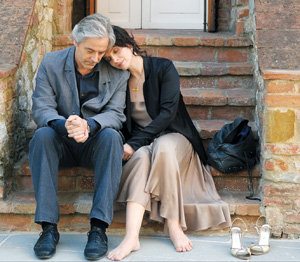

MAYBE ONE HAS to be married to understand Abbas Kiarostami‘s Certified Copy. And by then, of course, it’s too late. Working in Europe, the Iranian director is able to film things he wasn’t allowed to film in the Islamic Republic—figurative art, a woman’s bare shoulders, the suggestion of adultery.
Are-they-or-aren’t-they identity games are usually more fun for the directors and actors than they are for audiences. It’s a surprise, then, how much we feel for two people visiting the medieval hill town of Lucignano in Tuscany. Their exact relationship is not completely clear; to avoid potential spoilers, it could be said that we don’t know exactly how old their quarrel is.
One is Juliette Binoche, billed as “Elle” (she), an untidy but luscious woman of a certain age. She works in an antique store with all the light and charm of a catacomb. She comes up for air to attend the lecture of a visiting author. Being a local, she wants to show the writer some local sights. To paraphrase the ghost in the Christmas story: it’s not the long past she wants to show him—it’s his past.
Playing the author, James, is Kiarostami’s real find: William Shimell, a British opera singer who hasn’t been in films before. Shimell has a profile he’s clearly proud of, yet he’s approachable and self-deprecating.
While Elle is slightly schoolgirlish at first, her temper increases. James’ breeziness about the wisdom of children irritates Elle, who has been matching wits that day with her shrewd young son (Adrian Moore). The scene between mother and son is as incisive a piece of short-storytelling as I have ever seen. The kid is as good at button pushing as the strolling accordionists who keep turning up, making it a happy summer Sunday for everyone except the two leads.
Certified Copy reflects Rossellini’s 1954 Voyage in Italy, which also concerns a complex feuding couple. Played by Ingrid Bergman and a never-better George Sanders, Rossellini’s voyagers were mocked by the simple emotions captured forever in the ancient artifacts they saw.
Elle and James are headed to a small town where newlyweds go. In a museum, they see a jeweled golden tree, “in front of which young couples pledge their eternal love,” as a tourist video I found online says. Elle and James also linger around a fountain dedicated to familial bliss. There they talk to an elder married couple. The husband is played by Jean-Claude Carri re, who wrote the script for Unbearable Lightness of Being, back when Binoche was a young girl some 23 years ago.
The old man’s advice is intelligent. The fountain itself looks, from the glances Kiarostami gives it, like the corny Mussolini-ish statuary they used to erect outside Home Savings buildings.
But you’re on slippery terrain if you sneer at the art in this movie. Certified Copy is pointed at critics, just as it is aimed at the long-married types who mistake their spouses for pieces of furniture. As an author, James’ argument is something like a post-Marxist adaptation of Walter Benjamin’s essay on the mechanically reproduced image. In his book, James suggests that a copy deserves as much honor as the original—and that it is futile to seek a true original, lost in the depths of copy upon copy.
James tells a story of a woman moved by the replica of Michelangelo’s David in the Florentine piazza: a woman who didn’t realize the real statue is actually indoors and elsewhere. As a critic, James tries to convince himself to honor the emotion and forgive the mistake.
There is no shame in weeping at a movie, a copy, a mere counterfeit of emotion. It’s our own faults we weep for, anyway, our failures to love and forgive. And it is Binoche who makes Certified Copy so heartbreaking: her seeking of tenderness and approval from a man who won’t bend. In her search for signs of hope, Binoche builds on what could have been just an interesting game of acting, and she, above anyone, makes Certified Copy a genuine masterpiece.
Unrated; 106 min.



